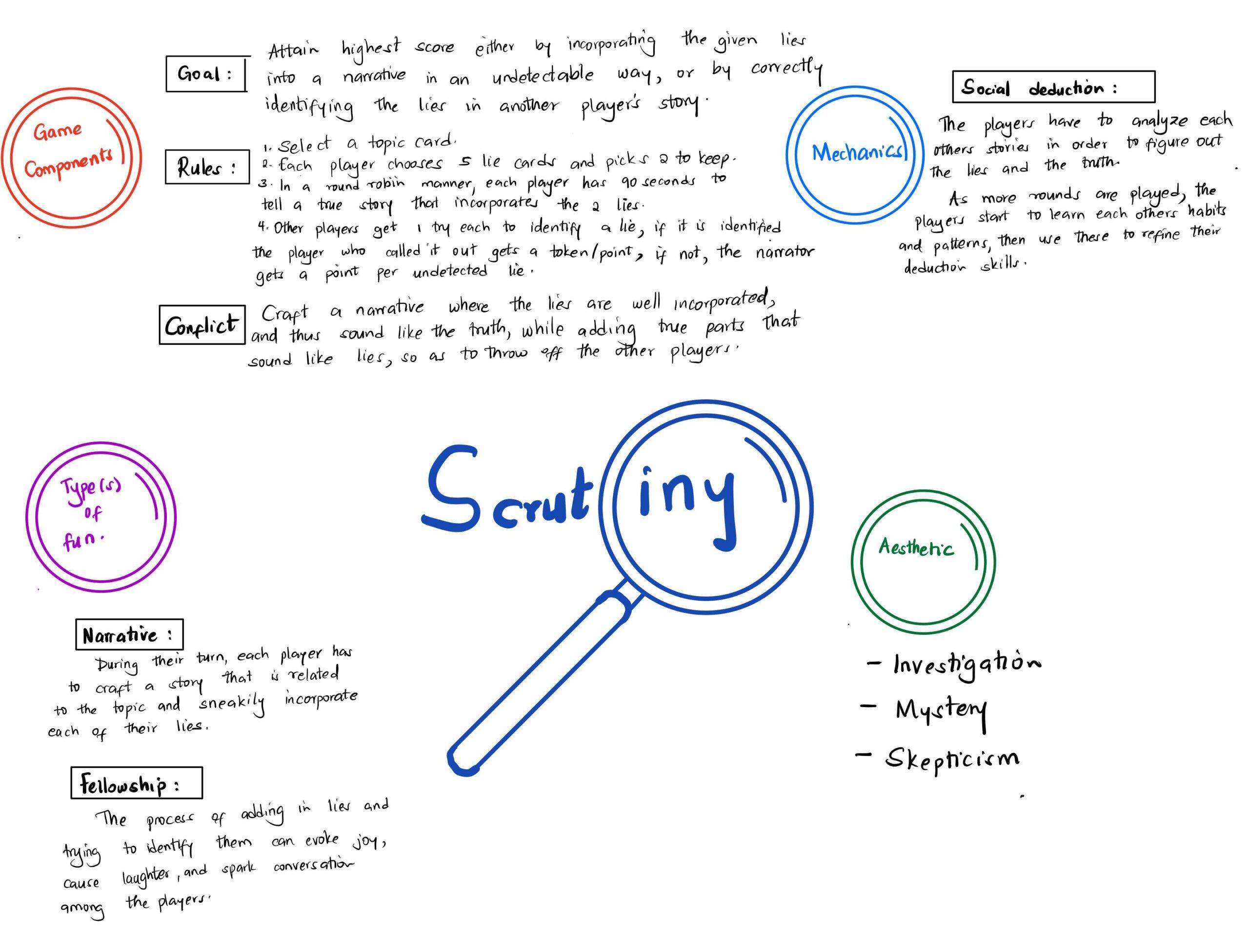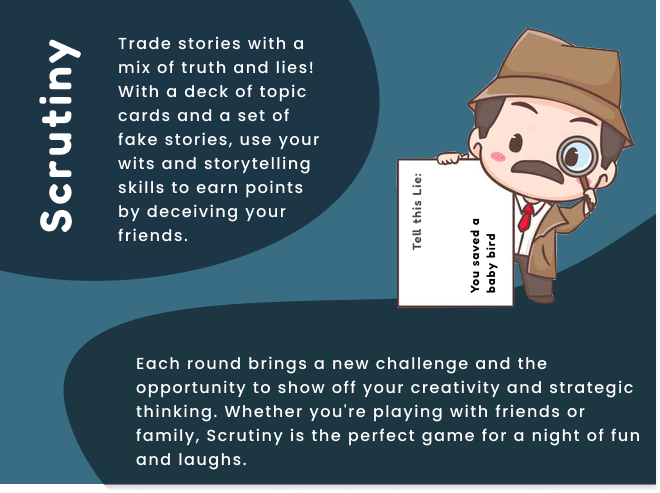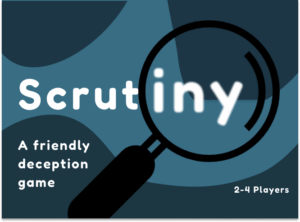Game Name: Scrutiny
Artist’s Statement: Scrutiny is a social deduction game which can be played by any number of people in a relaxed social setting. The game is primarily about storytelling, and encourages people to think creatively as they incorporate deception into personal stories. The freeform nature of storytelling between friends means that truth and fiction can be seamlessly intertwined, creating a new and engaging type of social deception. The core intention behind Scrutiny is to create an engaging experience that lets people connect with and learn about new friends while also letting them have fun by crafting imaginative fake situations. Weaving lies into true stories is both deception and genuine personal connection, complimented by the need to read deeply into others’ stories and personalities to uncover their lies. The game emphasizes the importance of listening carefully and observing subtle cues, creating deeper connections than a normal freeform conversation might. The open-ended nature of Scrutiny allows for playing in a relaxed party atmosphere, perfect for getting to know new people and learning about their lives. The game celebrates sharing the personal while allowing players to choose exactly how personal they go. At the same time, the deceptive gameplay keeps the audience engaged, creating connections that might never have been formed otherwise. This combination of mechanics invites players to embrace the challenge of understanding one another’s perspectives, lives, and lies.
Rules:
Player Count: 3+ players
Premise: Each round, one topic card is chosen for the group. Players all draw 5 lie cards and choose 2 lies to keep. If you drew cards that you have experienced before, redraw the cards from the deck. A player must incorporate both lies that they eventually keep, or they lose a point per lie that they don’t add. Players go around in a circle counterclockwise, each telling a story containing their 2 lies while the other players listen. Non-story telling players guess the lie within the story teller’s story, if they successfully guess the lie, the guesser gets to keep the lie card, if not, the story teller keeps the lie card. The objective is to gain as many lie cards as possible.
- At the start of each round, one topic card is chosen for the group.
- All players draw 5 lie cards and choose 2 lies to keep.
- If a player draws cards that they have experienced before, they must redraw cards from the deck.
- Players must incorporate both lies they keep in their story, or they lose a point for each lie they don’t add.
- Players take turns counterclockwise, telling a story that includes their 2 lies.
- Non-storytelling players guess the lie within the storyteller’s story.
- If a guesser successfully guesses the lie, whether or not that lie is in the card or not, they will earn a point (equivalent to a card) and take one of the storytellers chosen lie cards to keep. If no one can guess the lie in the end, the storyteller keeps the lie card.
- The objective of the game is to gain as many lie cards as possible.
Decisions we made when designing the game:
- Card-based gameplay: To encourage variety and replayability, a card-based system was chosen for Scrutiny. Taking experience from popular card games such as Cards Against Humanity, cards allow lots of potential topics and lies, ensuring that no two games will be the same. Additionally, the physicality of the cards promotes a more personal and interactive experience among players.
- Focus on storytelling and deception: Scrutiny emphasizes the importance of crafting engaging narratives and mastering the art of deception. The game encourages creativity, imagination, and strategic thinking, as players must weave convincing stories while incorporating lies that can deceive their fellow players.
- Group interaction and communication: A key aspect of the game is the active engagement among all players, as they take turns sharing stories and attempting to uncover hidden lies. This fosters a sense of camaraderie and trust-building, creating a more immersive and socially rewarding experience. By prioritizing group interaction, our game enables players to gain deeper unknown insights into one another’s personalities and perspectives.
- Open-ended gameplay: Instead of a predetermined endpoint, Scrutiny is designed to be played continuously for as long as the participants wish. This allows for a more relaxed experience, enabling players to focus on the enjoyment of the game rather than the pressure of reaching a specific goal.
We did three rounds of playtesting, each with 2-4 players.
Playtest 1 Experience/Feedback:
Number of players: 4
Each card is set up as a lie, but what if the person who drew the card had actually done the thing described? We decided on the fly to give the person the point for free if so, but people ended up not liking that rule.
We initially conceived the game so that people interrupted their partner to call out a lie. Some people did this, but others tried to wait until the end to call out the lies to be polite. When people did interrupt though, the story often got entirely derailed and we realized that people usually couldn’t finish telling a story after a lie had been called out which didn’t work so well.
One suggestion was that instead of having lies that each person needed to tell, we could have specific words they needed to include in their story. This would make it much easier to tell if someone did it or not, and also much easier to make specific guesses of what the words were.
We did 90 seconds per person, but it felt a bit short and some people didn’t finish in time.
Changes we made for next iteration:
Instead of calling out a lie during the story, the speaker tells their story in one go and the listener calls out lies at the end. We thought this would both improve the flow of the game and increase the expression aspect of fun as players had more of a chance to tell the stories they had thought of.
Increased the time each person has to tell their story to 3 minutes
Added in a discarding mechanic: instead of just getting 3 cards, players drew 5 and could choose how many cards they wanted to keep. This would add an extra layer of strategy because you could choose to be more or less ambitious in how many lies you tell. We hoped that there would be a dynamic of gauging confidence before the round similar to betting in a poker game.
Playtest 2 Experience/Feedback:
Number of players: 4
People were confused about the discarding mechanics: given 5 cards, they can choose how much to keep as how confident are they to incorporate them into their stories
People thought that it was a bit scary to do.
3 minutes seemed pretty long, and both people actually only took 2 minutes
Some people finished really fast, maybe we should add a time minimum?
Lots of confusion about calling out lies that aren’t in the cards: does the lie the partner calls out need to be exactly what the card says? What about supporting lies that build up to the card’s lie?
Some of the lies are too demanding, for example “you are set up on a blind date”. In this case, the teller would have to orient their whole story around it.
Changes we made for next iteration:
Get rid of the discarding mechanics by choice. Now everyone can pick 5 but can only keep 2 cards. We found that people struggled to include too many lies and it was often really obvious. If people were forced to use less lies, they might incorporate them better and the game might be more interesting to play.
Change the time per person to 2:30
Clarified lying rules: You lose a point if any lie is called out, not just the ones on the cards. This would incentivize people to tell a true story about themselves as much as possible and tell as few lies as possible.
Made a lot of changes to the card deck: Remove too obvious lies, added a new set of more generic lie cards that people should be able to incorporate more smoothly into their stories.
Playtest 3 Experience/Feedback:
Number of players: 6
We experiment with both 2 and 2:30 time. In both cases, some people finish early, some people need more time.
The playtesting environment was very loud, but having 3 pairs talking at the same time also contributed to the issue and all the pairs found it really hard to hear. Someone suggested playing as a bit group with only one person speaking instead.
There was still confusion about lies listed on the cards vs. lies that weren’t specifically included on the cards, mostly in terms of whether both were worth points for calling out at the end: we again needed to clarify this part of the rules better.
People found the points system a bit cumbersome to keep track of. Someone suggested getting rid of it, especially if we moved from pairs to a rotation system/
Heard that the game lets you learn from other people and get to know their personality through stories.
Changes we made for next iteration:
Change from a pair share to a group share, only one person tells their story with no time limit. Once they finish, everyone else in the group can go around to guess. This means we don’t need a time limit to keep pairs synchronized, and also don’t need an even number of players. We think that this will be more fun since people like telling stories in groups, and create a chiller game overall. Stories shared between the whole group would also increase the sense of fellowship as everyone hears the same set of stories together.
Now, since anyone in the audience can call out a lie, the points are given to the specific audience member who calls out each lie, with each member only getting one guess.
Link to final prototype + design mockup:
Video of the Final Playtest with user feedback
Link to Print and Play:






